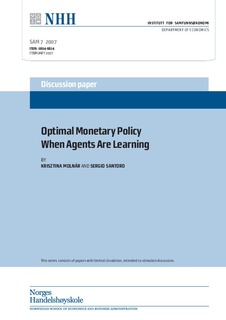Optimal monetary policy when agents are learning
Working paper
Permanent lenke
http://hdl.handle.net/11250/163056Utgivelsesdato
2006-11Metadata
Vis full innførselSamlinger
- Discussion papers (SAM) [657]
Sammendrag
Most studies of optimal monetary policy under learning rely on optimality conditions derived for the case when agents have rational expectations. In this paper, we derive optimal
monetary policy in an economy where the Central Bank knows, and makes active use of, the learning algorithm agents follow in forming their expectations. In this setup, monetary policy can influence future expectations through its effect on learning dynamics, introducing an
additional trade-off between inflation and output gap stabilization. Specifically, the optimal
interest rate rule reacts more aggressively to out of equilibrium inflation expectations and
noisy cost-push shocks than would be optimal under rational expectations: the Central Bank
exploits its ability to "drive" future inflation expectations closer to equilibrium. This optimal
policy qualitatively resembles optimal policy when the Central Bank can commit and agents
have rational expectations. Moreover, when beliefs are updated according to recursive least
squares, the optimal policy is time-varying: after a structural break the Central Bank should
be more aggressive and relax the degree of aggressiveness in subsequent periods. The policy
recommendation is robust: under our policy the welfare loss if the private sector actually has
rational expectations is much smaller than if the Central Bank mistakenly assumes rational expectations whereas in fact agents are learning.
Utgiver
Norwegian School of Economics and Business Administration. Department of EconomicsSerie
Discussion paper2007:7
